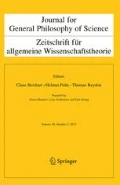Summary
Is mathematical knowledge the product of a method fulfilling temporally and locally invariant criteria and thus manifesting a rationality which sets it entirely apart from all other cultural products? Or is it a socially constructed product, sharing in the accidental and conventional nature of all historically contingent cultural products? In order to be able to take the latter point of view at all seriously into consideration, the most sophisticated and historically informed methodological model is carefully and critically examined. This (Lakatosian) model, however liberal and history-directed it may seem, turns out to incorporate the former, (methodo)logical view of the development of mathematics. It will be demonstrated that the basic assumption underlying Lakatosian methodology is both unwarranted and superfluous for the rational explanation of the growth of mathematical knowledge. This leads to the provisional conclusion that the relevant question is not whether mathematical progress derives ultimately from irreducibly cognitive or from irreducibly social factors, but how cognitive and social factors are interrelated and together, in their indivisible unity, are constitutive of the development of mathematical knowledge. In the forthcoming second part of the article, a model of this socio-cognitive interplay, relying heavily on empirical analyses, will be presented.
Similar content being viewed by others
References
Bendegem, J.-P. van (ed.): 1988, 1989, ‘Recent Issues in the Philosophy of Mathematics’,Philosophica 42, No. 2 &43, No. 1.
Fowler, D. H.: 1987,The Mathematics of Plato's Academy, Oxford.
Gardies, J.-L.: 1988,L'héritage épistémologique d'Eudoxe de Cnide: Un essai de reconstitution Paris.
Glas, E.: 1986, ‘On the Dynamics of Mathematical Change’,Studies in History and Philosophy of Science XVII, 249–268.
Glas, E.: 1988, ‘Between Form and Function. Social Issues in Mathematical Change’, in: Van Bendegem 1988, pp. 21–41.
Glas, E.: 1989a, ‘Testing the Philosophy of Mathematics in the History of Mathematics, Part I: The Socio-Cognitive Process of Conceptual Change’,Stud. Hist. Phil. Sci. XX, 115–131.
Glas, E.: 1989b, ‘Testing the Philosophy of Mathematics in the History of Mathematics, Part II: The Similarity Between Mathematical and Scientific Growth of Knowledge’,Stud. Hist. Phil. Sci. XX, 157–174.
Hallet, M.: 1979, ‘Toward a Theory of Mathematical Research Programmes’,Brit. J. Phil. Sci. 30, 1–25 & 135–159.
Kitcher, P.: 1984,The Nature of Mathematical Knowledge, New York.
Kuhn, T. S.: 1983, ‘Rationality and Theory Choice’,Journal of Philosòphy LXXX, 563–570.
Lakatos, I. and Musgrave, A. (eds.): 1970,Criticism and the Growth of Knowledge, Cambridge.
Lakatos, I.: 1976,Proofs and Refutations. The Logic of Mathematical Discovery, Cambridge.
Lakatos, I.: 1978aThe Methodology of Scientific Research Programmes, Philosophical papers Vol.1, J. Worrall & G. Currie, eds., Cambridge.
Lakatos, I.: 1978b,Mathematics, Science and Epistemology. Philosophical papers Vol.2, J. Worrall & G. Currie, eds., Cambridge.
Laudan, L.et al.: 1986, ‘Scientific Change: Philosophical Models and Historical Research’,Synthese 69, 141–223.
Laudan, R.et al.: 1988, ‘Testing Theories of Scientific Change’, in A. Donovanet al., Scrutinizing Science, Dordrecht, pp. 3–44.
Popper, K. R.: 1972,Objective Knowledge, Oxford.
Riddell, R. C.: 1979, ‘Eudoxan Mathematics and the Eudoxan Spheres’,Archives for the History of Exact Sciences XX, 1–19.
Suppes, F. (ed.): 1977,The Structure of Scientific Theories, second ed., Urbana, Chicago, London.
Tymoczko, T. (ed.): 1985,New Directions in the Philosophy of Mathematics, Boston.
Wilder, R. L.: 1981,Mathematics as a Cultural System, Oxford.
Author information
Authors and Affiliations
Rights and permissions
About this article
Cite this article
Glas, E. Mathematical progress: Between reason and society. J Gen Philos Sci 24, 43–62 (1993). https://doi.org/10.1007/BF00769514
Published:
Issue Date:
DOI: https://doi.org/10.1007/BF00769514



